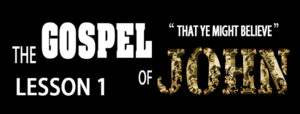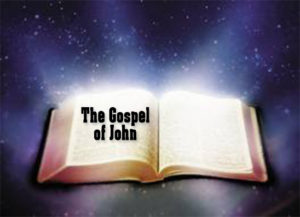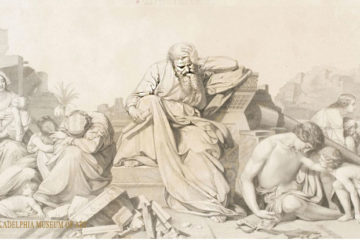John Lesson 1 Introduction
 A Contextual Study Of The Gospel Of John
A Contextual Study Of The Gospel Of John
The apostle John was focused on the eye witness account of the ministry of Jesus Christ. He teaches us the importance of believing in Jesus Christ. John was the writer who reveals the only begotten son.
Lesson 1
 Use the King James Bible for your responses If you don’t have one, see our Materials section to order one or click on the following link for an online King James Bible: https://www.kingjamesbibleonline.org/index.php
Use the King James Bible for your responses If you don’t have one, see our Materials section to order one or click on the following link for an online King James Bible: https://www.kingjamesbibleonline.org/index.php
Answer all questions and fill in the blanks as you proceed. Take time to “drink” in the Word and learn from the Scriptures. Print a hard copy of this teaching so you can more effectively learn and remember the precepts. Please write us if you have questions: RestorationOfTheFamily@gmail.com
This lesson is designed to help you see the importance of correctly interpreting the words that are recorded in the Bible and the need for personal study of the Word instead of totally relying upon others to teach you through sermons and presentations. The latter are important; however, they fall short of the test of qualifying you as a workman and especially one that can correctly interpret and apply the Word to your life. (2 Timothy 2:15).
Another goal is to encourage you to write responses and to use your Bible. Such disciplines help students of the Word to remember longer the teachings to which he is exposed. Additionally, many have gotten away from reading the Bible from a hard copy and in so-doing (reading from their electronic devices) are losing the ability to find and recognize where Scriptures are located, even some becoming so crippled by the aforementioned that they aren’t sure of what books are in the New or Old Testaments, and should their electronic devices become unavailable, many would be without a Bible or without the ability to readily locate Scriptures.
As you continue your study, you will see an emphasis on recognizing the infallibility of Scripture and the importance of believing that God wrote the Bible through Holy men that He choose and that He has preserved His Word (the Bible) for all generations. The LORD strongly warns against adding to or taking from the Words of the Bible: Deuteronomy 4:2; Proverbs 30:6, Revelation 22:18-19.
Fill in the blanks in the following and all other indicated areas in this study:
The words of the LORD are ______________ words: as silver tried in a furnace of earth, purified seven times. Thou shalt keep them, _______________________________, thou shalt ______________________ them from this generation for ever. Psalm 12:6-7
Every _______________ word of God is ______________________: he is a shield unto them that put their trust in him. 6Add thou not unto his words, lest he reprove thee, and thou be found a _____________. Proverbs 30:5-6
- What is the significance of the words every and pure? How seriously should we consider the warning in verse 6? … and thou be found a liar?
_________________________________________________________________________________________________
But the fearful, and unbelieving, and the abominable, and murderers, and whoremongers, and sorcerers, and idolaters, and ________________, shall have their part in the lake which burneth with fire and brimstone: which is the second death. Revelation 21:8
The Importance of Context
The focus of our study is not just reading through Scriptures but learning how to study doctrinally and critically through contextual understanding of the Biblical text. We will lay groundwork for studying the Bible, “line upon line,” by completing contextual exercises as we move through the gospel of John. This will serve to build a foundation, word-by-word, verse-by-verse.
How do we know this is the correct way to study? Consider Isaiah 28:9-10.
“Whom shall he teach knowledge? and whom shall he make to understand doctrine? them that are weaned from the milk, and drawn from the breasts. For precept must be upon _______________, precept upon ______________________; line upon ____________, line upon line; here a __________, and there a little.” Isaiah 28:9-10
2. What does Isaiah 28:9-10 mean to you?
3. What is the difference between an epistle and a gospel?
4. The four gospels __________________________________________ (List them, the first four books of the New Testament.) deal with the earthly life of our Saviour Jesus Christ, but each gospel presents the LORD from a different point of view. What are some of these differences among the gospels? Write your thoughts before reading further. Answers will vary as there are many differences.
5. The gospel of ____________ begins with the generations of Jesus, gives us a narrative of the supernatural conception of Jesus through the eyes of Joseph, Mary’s husband; the visit of the wise men, the baptism of Jesus by John the Baptist (not the same person as the writer of the gospel of John), the temptation of Jesus by Satan, the Sermon on the Mount, and many of the works of Jesus’ ministry as well as the account of His crucifixion, death, and resurrection.
6. The gospel of ____________ portrays the LORD Jesus as the Servant of God with a focus on the calling of the disciples, healings, and miracles. Twelve of the chapters of this book begin with the word AND showing its internal connectivity and indicating a break in an indeterminate period of time. It’s a book of deeds including many miracles and and four parables. There is an emphasis on Jesus teaching and through His life giving examples for us to follow as we teach others.
7. The gospel of ____________focuses on the humanity of the Saviour. It presents Him as perfect Man, contrasting Him from the sinful sons of men. The author of this book is a doctor, a Gentile, with the viewpoint of the birth of Jesus given from that of Mary. We also are given insight to the conception of John the Baptist and Mary’s time with Elisabeth., the mother of John the Baptist. This book has more words in it than any other New Testament book.
8. The gospel of ____________views Jesus as the Heavenly One Who came down (was sent=begotten) to earth. Jesus is presented as the eternal only begotten Son of the Father, made flesh, and tabernacled among men. It includes one of the most memorized verses in the Bible from Chapter three, verse 16:
For God so loved the world, that he gave his only ____________________ Son, that whosoever believeth in him should not perish, but have _______________________________ life.John 3:16
Jesus is the Christ, the Son of God. To learn the stated purpose for what was included in the gospel of John, read John 20:30,31: “And many other signs truly did Jesus in the presence of his disciples, which are not written in this book: But these are written, (1) that ye might believe that __________________________________________________________________________ and that believing (2)_________________________________________________________________.”
9. Circle the word name (above). What did seeing Jesus in the flesh and the works He did do for the disciples? “This beginning of miracles did Jesus in Cana of Galilee, and manifested forth his glory; and his disciples ________________________.” John 2:11
John uses the word believe (and forms of it) more than any other writer. This word, with its forms, is used 99 times in the book of John. It’s evident that this apostle desires that we would believe in the name, works, and power of Jesus Christ by following His commandments and precepts.
10. The gospel of John focuses not on the complete life and work of Jesus but at most 20 days out of the 1,000 days of our Lord’s ministry (ISBE Dictionary). The Gospel of John is written by an author who is personally present at the scenes he describes. These proofs are strongly validated throughout his text. An example is in John 1:14: “And the Word was made flesh, and dwelt among us, (and ________ beheld his glory, the glory as of the only begotten of the Father,) full of grace and truth.” What does “we beheld” mean? Can you tell by the context that they witnessed or saw something?
The importance of eye-witness validation of what Jesus did and others saw is repeatedly emphasized by John through his repetitive use of terms such as witness (used 22 times) and record (used 10 times). The Gospel of John focuses on the spiritual revelations of Jesus and how they played a primary role in the John’s life, who was also called an apostle. The qualifications of an apostle included having been with Christ during His ministry, having personally witnessed Jesus after His resurrection, and having been empowered by the Holy Spirit to perform miracles or signs.
Importance of Being Born Again
John’s gospel is the only gospel which gives specific instruction on the importance of being born again—the spiritual relationship for all sons (includes male and female) of God; that is, the necessity of being born of the Spirit. “But as many as received him, to them gave he power to become the sons of God, even to them that believe on his ___________: Which were born, not of blood, nor of the will of the flesh, nor of the will of man, but of God.” John 1:12-13 “… Except a man be ______________________, he cannot see the kingdom of God.” John 3:3 (This doctrine is expanded in I John (This epistle is written by the same author as the gospel of John). Notice John’s similar eye-witness validation is also very evident in 1 John 1:1-3.) Underline or circle in your Bible or below evidences of eye witnesses. One example of this eye-witness account is given below with a red font to help you get started.
1 John 1:1-3: 1 That which was from the beginning, which we have seen with our eyes, which we have looked upon, and our hands have handled, of the Word of life; 2 (For the life was manifested, and we have seen it, and bear witness, and shew unto you that eternal life, which was with the Father, and was manifested unto us;) 3 That which we have seen and heard declare we unto you, that ye also may have fellowship with us: and truly our fellowship is with the Father, and with his Son Jesus Christ.
11. In the gospel of John, we see three types of character traits:
- Jesus whose character and purpose was same throughout—to glorify the Father, being the One Who was Sent from the Father (begotten)—the Word;
- The disciples—who grew in the faith (and love toward Jesus);
- The enemies, the Jews, who grew in hatred toward Jesus to the culminating act of crucifixion.
Introduction to Studying Contextually
12. Without reading further, define these words: gay, wonderful, and counsellor (some Bibles, counseller).
Gay:____________________________________________________________
Wonderful:_____________________________________________________
Counseller (Counselor) :_____________________________________________________
13. What is it that gave you your understanding of these words?
Consider the following regarding your definition of gay:
Deck the halls with boughs of holly, Fa la la la la, la la la la. Tis the season to be jolly … Don we now our gay apparel …
14. What is the Biblical contextual definition of gay? Consider the Scripture below:
“And ye have respect to him that weareth the ______________________, and say unto him, Sit thou here in a good place; and say to the poor, Stand thou there, or sit here under my footstool.” James 2:3
Notice the word gay has nothing to do with sexual orientation (how gay is used in many discussions today) but how a person is dressed. The is a great example to help you understand the importance of context; that is,
- getting meanings from surrounding words, cross references, and
- studying how a word is used in other chapters or books of the Bible. Dictionaries and other references resources such as Strong Concordance should not be our primary way of determining the meaning of words in the Bible.
- Determination of the meanings of words in the Bible should be focused on Scripture–from within the Bible itself;
- Meanings of words change according to the context in which they are used.
From the example of the Biblical definition of gay, how does context make a difference in determining the definition of a word? Can you see how the Bible can serve as its own dictionary and why relying on man-made resources can sometimes give wrong interpretations of the Scriptures?
15. Do a contextual Biblical study of wonderful and counsellor. Apply your results to:
“For unto us a child is born, unto us a son is given: and the government shall be upon his shoulder: and his name shall be called Wonderful, Counseller, The mighty God, The everlasting Father, The Prince of Peace.” Isaiah 9:6
Some wrongly combine the two bolded words making wonderful an adjective and counsellor a noun modified by wonderful and removing the comma. They thus say, “He is a wonderful counseller,” describing what He does, instead of reflecting, in this context, one of His many names: … his NAME shall be called Wonderful … his NAME should be called … counseller; his NAME shall be called … The Mighty God. This is another example that shows the importance of context. Wonderful, in THIS context demands its usage as a specific title.
Look up the Scriptures below. Fill in the missing words. Read the entire verse and surrounding ones if necessary to get an understanding of the contextual meaning of the word you supplied. You will get a feel for the awesomeness of His name and works as being Wonderful and His name and works as Counsellor. Write below each portion of the following Scriptures what the context indicates “wonderful” means in that verse. You will discover the Biblical contextual meaning of wonderful changes with the context.
Deuteronomy 28:59: Then the LORD will make thy plagues _______________________ … and of long continuance, and sore sicknesses …
Most consider the word wonderful as something positive, extremely good;, outstanding; however, the Biblical context tells us something very different about the correct interpretation of wonderful as it is used (context) in verses such as Deuteronomy 28:59.
| 2 Chronicles 2:9: … for the house which I am about to build shall be ____________________ great.
Job 42:3: … that I understood not; things too _______________ for me, which I knew not. Psalm: 40:5: Many, O LORD my God, are thy _______________ works which … Psalm: 78:4: … and his ________________ works that he hath done. Psalm: 107:8: Oh that men would praise the LORD for his goodness, and for his ______________ works … Notice this verse is repeated three times: 107:15, 107:21, 107:31 Psalm: 111:4: He hath made his __________________ works to be remembered … Psalm: 119:129: Thy testimonies are ________________________ … Psalm: 139:6: Such knowledge is too ______________________ for me. Here is an excellent example of the Scripture having its own dictionary. If you read the rest of verse six, the contextual meaning IN THIS VERSE of wonderful becomes clear: … it is high, I cannot attain [comprehend] it. Learning to read the words in the Bible from a contextual point of view adds much richness to the study of God’s Word. We can never comprehend the name of Jesus. It is too “wonderful”! (Study all of Psalm 139.) The contextual meaning of wonderful in Proverbs 30:18 is similar to that in Psalm 139:6. Proverbs 30:18: There be three things which are too _____________________ for me, yea, four which I know not. In verse 19, the LORD gives these four things. Notice additionally in verse 20, God compares the adulteress to all four; i.e., such behavior (adultery, sexual sin) is incomprehensible! 18 There be three things which are too _____________________ for me, yea, four which I know not: 19 The way of an ____________ in the air; the way of a _____________ upon a rock; the way of a __________ in the midst of the sea; and the way of a man with a maid. 20 Such is the way of an ___________________ woman; she eateth, and wipeth her mouth, and saith, I have __________________ wickedness. Proverbs 30:18-20
Isaiah 25:1: … for thou hast done ___________________ things … Read verse two to glean the contextual meaning of wonderful in verse one: FOR thou hast made of a city _______________, of a defenced city a __________ … Jeremiah 5:30: A ______________ and horrible thing is committed in the land; 31 The prophets ____________________________, and the priests bear rule by their means [make up their own rules]; and my people love it so …The Israelites loved wickedness. Matthew 7:22-23: Many will say … and in thy name done many _______________works? And then will I profess unto them, I never knew you …” Matthew 21:15: And when the chief priests and scribes saw the ____________________ things that he did … they were sore displeased. Proverbs 11:14: Where no counsel is, the people fall: but in the multitude of __________________ there is safety. Isaiah 41:28: For I beheld, and there was no man; even among them, and there was no ____________________, that, when I asked of them, could answer a word. Nahum 1:11: There is one come out of thee, that imagineth evil against the LORD, a wicked ______________________. 16. Counsellor: A confidential adviser; an official adviser; person trained to give guidance; however, that counsellor should give Biblical advice. Many did not give (and do not today) Biblical advice as recorded in the Old Testament. In the New Testament, we are told that people LOOK for those who will tell them what they want to hear (what the Bible calls itching ears), especially when they are living in sin or want to enter into a sinful lifestyle, such as an adulterous marriage: Whosoever putteth away his wife, and marrieth another, committeth ________________: and whosoever marrieth her that is put away from her husband committeth _______________________. Luke 16:18 2 Timothy 4:3-4: For the time will come when they will not endure sound doctrine [what the Bible says]; but after their own __________ shall they heap to themselves teachers, having ______________ ears; 4 And they shall turn away their ears from the truth, and shall be turned unto fables. 17. Write another definition of wonderful if your Biblical understanding of this word has changed and as it applies to Scripture and would be more concise contextually for Isaiah 9:6 than you perhaps wrote earlier in this study sheet. Likewise, write a Biblical definition of gay.
18. An epistle is a letter written to a person or a church or a group of people. A gospel is a historical account of the life of the Lord Jesus. Studying or Reading the Bible
|


